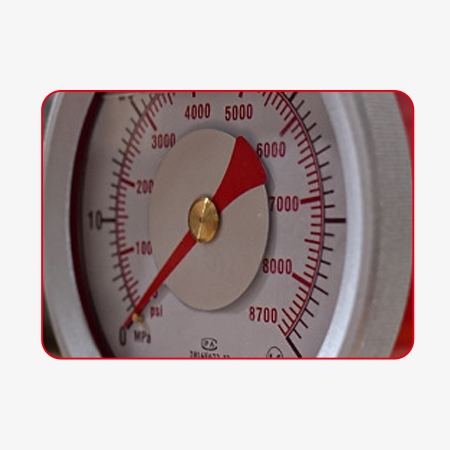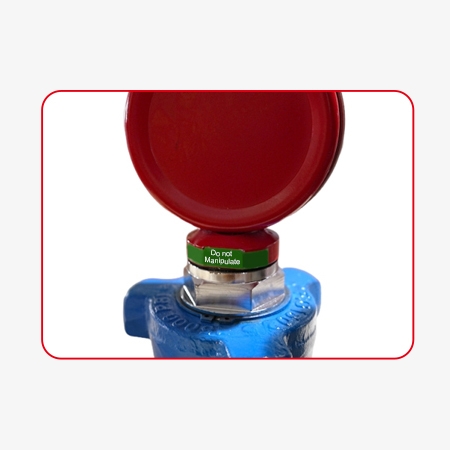The diesel fuel pressure tester is designed for pulsating and shock pressures, featuring damping for vibration resistance, a corrosion-resistant and wear-resistant diaphragm, oil-filled cushioning, multi-range high precision, a pressure relief structure, and optional custom connections and dual scales.
Note: If you need other sizes, please contact customer service.

Dedicated to Harsh Operating Conditions
- The core function of this diesel oil pressure gauge is to measure pulsating pressure and withstand instantaneous shocks. Its internal damping mechanism effectively suppresses pressure fluctuations, converting pulsating pressure into a stable average value for indication without additional adjustments.
- This diesel fuel pressure gauge tester employs an isolated design, completely isolating the measured medium from the core instrument structure through sealing gaskets and diaphragm assemblies. It can directly measure high-viscosity, high-particle-size, or easily solidifying media, such as mud and cement, without causing blockage or damage to the internal channels of the instrument.
- The diesel oil pressure tester's gauge head is filled with methyl silicone oil. This design provides a dual advantage: firstly, it provides additional liquid damping for pressure pulsations; secondly, by allowing moving parts (such as the pointer shaft) to operate in the oil, it effectively absorbs mechanical vibrations from the external environment, preventing excessive pointer sway due to vibration, thus ensuring normal operation even in environments with strong vibrations.

Multi-Range High Precision
- The diesel fuel rail pressure gauge offers multiple measurement ranges from 0-16MPa to 0-100MPa, with 1.6 or 2.5 accuracy grades for different ranges. Users can choose the most suitable model based on their actual pressure level and accuracy requirements.
- A lubrication screw is designed on the top of the gauge. This structure provides an important function: releasing internal pressure buildup caused by changes in ambient temperature. This prevents potential safety hazards such as gauge rupture or seal damage due to excessive internal pressure, and also simplifies daily maintenance. Simple operations before installation and during disassembly are all that's needed to effectively protect the gauge.
- In addition to the standard configuration, the gauge offers flexible customization options when ordering. Users can choose to add union screws (welded or threaded) to accommodate different piping connections; they can also request changes in pressure units (such as bar, psi) or the use of a dual-scale dial.
Applications
In industrial production, a pressure meter ensures equipment safety and process stability; in public services, a pressure gauge maintains daily operation and safe use; in the medical and health field, a pressure test gauge assists in diagnosis and treatment; in scientific research and high-end manufacturing, a pressure reader supports research and development and reliable equipment operation.

Public Services

Healthcare

High-End Manufacturing

Industrial Production
| Model | SISCO-PG-YK150Y | ||
| Nominal Bore Diameter | 2-1/16in | ||
| Flange Pressure | 10000psi | ||
| Pressure Range | 0~16MPa, 0~25MPa | Accuracy | 2.50% |
| 0~40, 0~60, 0~80, 0~100 | 1.60% | ||
| Operation Temperature | -25℃~+55℃ | ||
| Weight | 13kg | ||
Q1: How does a tire pressure gauge work?
A1: A tire pressure gauge works by measuring the air pressure inside a tire. When you press the gauge onto the tire's valve stem, air from the tire enters the gauge. Inside the gauge, a calibrated spring or sensor measures the force exerted by the air pressure. This force is then translated into a readable value on the gauge's dial or digital display, indicating the tire's pressure in units such as PSI (pounds per square inch) or kPa (kilopascals).
There are different types of tire pressure gauges, including analog (dial) gauges, digital gauges, and stick gauges. Analog tire pressure gauges use a mechanical spring to provide a pressure reading, while digital tire pressure gauges use electronic sensors to measure the pressure and display the result on a screen. Stick gauges, also known as pencil gauges, have a simple, retractable rod that is pushed out by the air pressure, showing the reading on a marked scale. All these gauges serve the same purpose: ensuring that your tires are inflated to the correct pressure for optimal performance and safety.
Q2: Which type of tire pressure gauge is most accurate?
A2: The most accurate type of tire pressure gauge is generally considered to be the digital gauge. Here are a few reasons why:
- Precision and Readability: Digital gauges typically provide precise readings, often to a decimal point, which can be easier to read compared to analog gauges. They eliminate the parallax error that can occur when reading a dial gauge.
- Consistency: Digital gauges are less likely to be affected by environmental factors such as temperature and humidity, which can sometimes impact the accuracy of mechanical (analog) gauges.
- Calibration: Digital gauges often maintain their calibration longer than analog gauges. However, it's still important to occasionally check and recalibrate any tire pressure gauge to ensure its accuracy.
Q3: Is a tire inflator the same as an air compressor?
A3: A tire inflator and an air compressor are not the same, although they serve related purposes. A tire inflator is specifically designed to inflate tires and usually comes with built-in pressure gauges and attachments that fit onto tire valves. It is typically portable, easy to use, and can be powered by a car's cigarette lighter or battery.
An air compressor, on the other hand, is a more versatile tool that can be used for a variety of tasks beyond inflating tires, such as powering pneumatic tools, painting, and cleaning. Air compressors are generally larger and more powerful than tire inflators, often requiring a separate power source. While an air compressor can be used to inflate tires with the appropriate attachments, its primary function is to provide compressed air for a wider range of applications.
Tips: Advantages of Diesel Fuel Pressure Gauge
A diesel fuel pressure gauge is a crucial diagnostic tool for ensuring the efficient operation of diesel engines. Its core advantage lies in accurately monitoring fuel system pressure, helping to quickly pinpoint faults caused by abnormal pressure, such as starting difficulties, insufficient power, and increased fuel consumption, avoiding blind repairs and significantly improving diagnostic efficiency. Through real-time data feedback, it ensures that the fuel injectors operate at optimal pressure, optimizing fuel atomization and improving combustion efficiency, thereby reducing fuel consumption and emissions. Furthermore, it can provide early warnings of wear on components such as the high-pressure fuel pump and pressure regulator, preventing sudden malfunctions and extending engine life.
Thank you for buying industrial test and measurement equipment on SISCO.com, all products sold by SISCO and the partner cover a 12 months warranty, effective from the date of receiving the products.
What is covered?
SISCO is responsible for providing free spare parts, and free technical support to assist the customer to repair the defective products until the problem is solved.
What is not covered?
- Product purchased from anyone other than a SISCO store or a SISCO authorized reseller.
- Expendable parts.
- Routine cleaning or normal cosmetic and mechanical wear.
- Damage from misuse, abuse or neglect.
- Damage from use of parts other than SISCO approved.
- Damage from use outside the product’s usage or storage parameters.
- Damage from use of parts not sold by SISCO.
- Damage from modification or incorporation into other products.
- Damage from repair or replacement of warranted parts by a service provider other than a SISCO authorized service provider.
- Damage caused by the application environment not meeting the product usage requirements and the failure to perform preventive maintenance.

